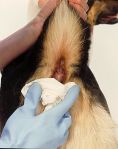Common veterinary mistakes, mishaps and stress May 7, 2009
Posted by thedolittlevet in Humour.Tags: error, funny, Humour, mishap, mistake, story, stress, vet, veterinary
14 comments
Mishaps occur frequently in the veterinary profession. As with other walks of life, nothing is perfect and errors can occur. Below are a list of some of the more common mistakes that happen in our daily lives as a vet:
Anal gland expression – A common complaint of pet owners is the discomfort (leading to’ scooting’ of the backside) caused by blocked anal glands in their pets. This is easily relieved by squeezing the glands to empty the secretion. As most pet owners can testify, the result is a foul fishy smelly liquid being released. Unfortunately, as the glands are squeezed, it is not uncommon for the secretion to come out with some force and shoot into the vet or innocent bystanders’ (often a nurse!) face…. delightful as you can imagine!

Steady, then aim and fire!
Viscous injection problems – Certain injectable drugs such as antibiotics, heartworm prevention and euthanasia medication can be quite viscous (thick) fluids. Sometimes, when injecting, the drug refuses to pass through the needle and causes an “explosion” of fluid everywhere (except into the patient!). This is most embarrassing during a euthanasia consultation, where you always hope everything runs smoothly to avoid causing any further distress to pet owners.
More injection problems…..in and then out again – Sometimes, drugs and fluids can also be injected into skin of a pet but then come straight out the other side – occasionally, soaking the owner! This was made famous in the UK on television by celebrity vet Trude Mostue when giving a vaccination.
Struggling to find a vein – This can happen when either placing an intravenous catheter to administer fluids or taking a blood sample. Sometimes, by “jabbing” in a needle numerous times, it appears as if we are giving an acupuncture session! This can be stressful especially, if the owner is present during our attempts and asking if we’ve finished yet! The pet being held properly and not obese, makes it a lot easier!

What neck vein???
Giving the wrong vaccination– It has been known for vets to accidentally give a cat vaccine to a dog and vice versa. Fortunately, this doesn’t normally lead to any serious adverse reactions apart from not giving the necessary protection intended.
Escaping pets and then trying to capture them – Aggressive cats and scared birds are the most common creatures that try to desperately escape during a visit to the vet clinic. Angry cats in particular can take a long time to catch – leading to numerous injuries to veterinary staff!

Catch me if you can (or dare)!
Spaying a male cat – In the UK, flank spays (ovariohysterectomies where the incision is made on one side of the cat) are regarded as the routine technique. It has been known for vets to accidentally attempt a spay on a male cat. Obviously, after not being able to find a uterus/ovaries in the abdomen during surgery – they later realise to their dismay that there are 2 testicles at the rear end of the cat!
Biting hamsters – These little creatures (especially Syrian hamsters) have a nasty little bite on them. Naturally being a prey species, they are often terrified when being handled and understandably defend themselves by biting. The problem is that their sharp needle like teeth really hurt and vets have been known to drop or “flick” these little furry pets leading to nasty injuries, like paralysis or even death?

Looks innocent?
Misidentifying species or sex – Some pets, especially small ones can be very difficult (e.g. very young kittens) or impossible (birds unless using DNA or endoscopy) to identify their sex – often leading to owners giving inappropriate names! Certain exotic species can give us even more problems with their identification. How many vets can correctly differentiate between a Marginated and Russian tortoise? Worse still, we don’t always correctly identify all dog or cat breeds! Do you know what a Hovawart looks like?

Which species???
Forgetting the owner or pet – We see many pets and owners with common problems everyday. Obviously, we often can remember regular clients who have been coming in for many years. However, if we see someone outside of work, who comes in less frequently, it is not easy to recall their exact pet and the problem last week. This can cause difficulties if they start talking to you about their pet. We can either bluff our way through the conversation or be honest and say, we don’t remember their pet (which probably won’t go down too well!). I have known of one vet forgetting he euthanased their pet a few months earlier and then asking at a later date, how the pet was getting on!!